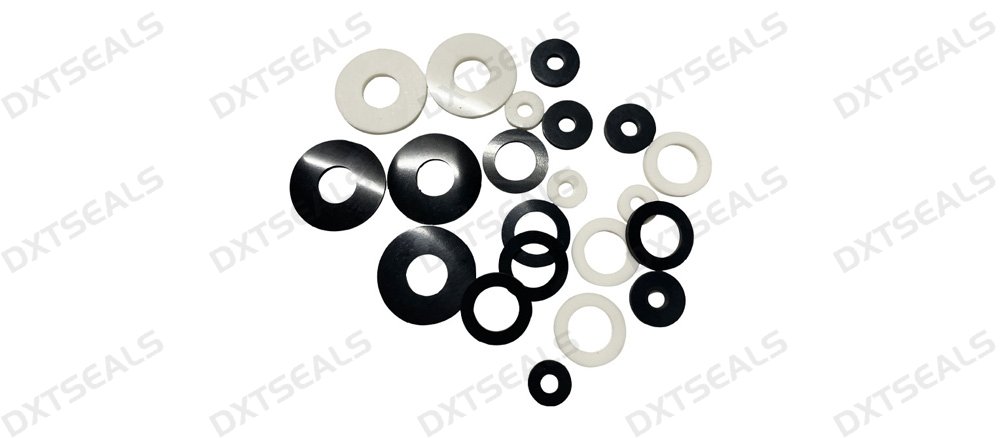
Rubber washers are indispensable components in numerous industries, offering sealing, cushioning, and vibration-dampening functions. Choosing the right rubber washer ensures the efficiency and longevity of your equipment, reducing maintenance costs and downtime. This guide explores how to select the ideal rubber washer, its applications, and the industries that benefit the most from these versatile components.
Understanding Rubber Washers
Rubber washers are flat, disc-shaped components made from various rubber materials. Their primary functions include:
- Sealing: Preventing leaks in fluid and gas systems.
- Cushioning: Absorbing vibrations to protect equipment.
- Insulating: Providing thermal and electrical insulation.
- Load Distribution: Distributing pressure evenly to prevent damage to surfaces.
Factors to Consider When Choosing Rubber Washers
-
Material Type:
- NBR (Nitrile Rubber): Resistant to oils, fuels, and other hydrocarbons; suitable for automotive and industrial applications.
- EPDM: Excellent resistance to weathering, UV, and ozone; ideal for outdoor use.
- Silicone: Tolerates extreme temperatures; used in food-grade and medical applications.
- Viton (FKM): Resists high temperatures and aggressive chemicals; commonly used in chemical processing.
-
Operating Conditions:
- Temperature Range: Choose materials that withstand the specific temperature extremes of your application.
- Chemical Exposure: Ensure compatibility with the chemicals present in the environment.
- Pressure Levels: Select washers designed to handle high-pressure systems without deformation.
-
Dimensions and Design:
- Ensure the washer fits snugly into the designated space without compromising functionality.
- Opt for custom designs if your application has unique requirements.
-
Durability:
- Consider the lifespan of the material under operating conditions to reduce replacement frequency.
-
Standards and Certifications:
- Verify compliance with industry standards, such as ISO, FDA, or RoHS, depending on the application.
Applications of Rubber Washers
-
Plumbing and HVAC Systems:
- Sealing pipes, valves, and fittings to prevent leaks and ensure efficient operation.
-
Automotive Industry:
- Used in fuel systems, brake assemblies, and engines for sealing and vibration dampening.
-
Aerospace Industry:
- Providing reliable seals in critical systems, such as fuel tanks and hydraulic systems.
-
Electronics and Electrical Systems:
- Acting as insulating components to prevent electrical short circuits.
-
Industrial Equipment:
- Used in pumps, compressors, and machinery to minimize vibrations and ensure leak-free performance.
-
Construction:
- Providing weatherproof seals in windows, doors, and roofing systems.
-
Food and Beverage Industry:
- Ensuring hygienic seals in processing equipment with food-grade rubber washers.
Industries That Rely on Rubber Washers
-
Oil and Gas:
- Ensuring leak-proof seals in pipelines and high-pressure systems.
-
Chemical Processing:
- Withstanding aggressive chemicals and maintaining safety in processing plants.
-
Renewable Energy:
- Used in solar panels, wind turbines, and other systems to ensure long-lasting performance.
-
Healthcare and Pharmaceuticals:
- Sealing medical devices and equipment with non-toxic, sterilizable washers.
-
Marine Industry:
- Providing corrosion-resistant seals for underwater and offshore applications.
Benefits of Using Rubber Washers
-
Versatility:
- Available in various materials to suit diverse applications.
-
Cost-Effectiveness:
- Reducing maintenance and replacement costs by providing durable performance.
-
Energy Efficiency:
- Preventing leaks and vibrations to improve system efficiency.
-
Environmentally Friendly Options:
- Eco-friendly materials available for sustainable operations.
-
Customization:
- Tailored designs to meet specific industry requirements.
Tips for Selecting the Perfect Rubber Washer
- Consult Experts: Work with reputable manufacturers to find the best material and design for your needs.
- Understand Application Requirements: Consider temperature, pressure, and chemical exposure.
- Test for Compatibility: Ensure the washer performs well under actual operating conditions.
- Prioritize Quality: Choose high-quality washers to ensure reliability and longevity.
Conclusion
Rubber washers are vital for ensuring the efficiency and safety of equipment across numerous industries. By understanding the operating conditions and material properties, you can select the perfect washer for your application. Whether for automotive, industrial, or food-grade use, the right rubber washer enhances system performance and minimizes maintenance costs.
For expert guidance and high-quality rubber washers, connect with trusted manufacturers like DXTSEALS to explore tailored solutions for your specific needs.
